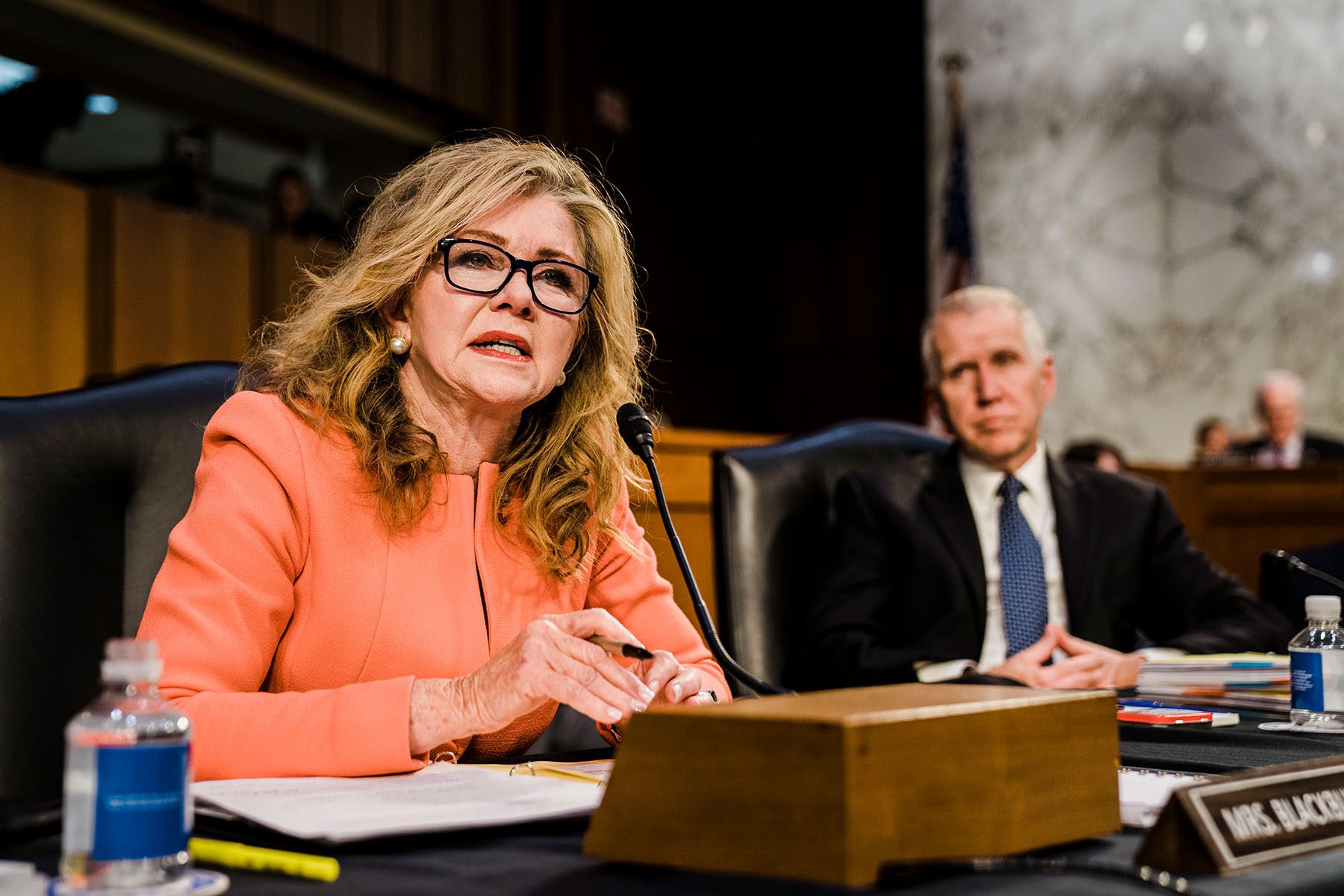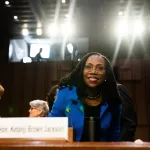When it was Sen. Marsha Blackburn’s turn to question Judge Ketanji Brown Jackson late Tuesday, the Tennessee Republican complimented the Supreme Court nominee’s credentials and drive, mentioned Jackson’s beaming father behind her, then launched into a series of questions related to gender.
One was about a Supreme Court decision striking down the Virginia Military Institute’s men-only admissions policy. Justice Ruth Bader Ginsburg — a liberal icon and lifetime advocate for women — wrote in the majority opinion that “physical differences between men and women … are enduring.” Ginsburg argued that to deny a group of people opportunity (in this case, women), the justification “must not rely on overbroad generalizations about the different talents, capacities, or preferences of males and females.”
“Do you agree with Justice Ginsburg, that there are physical differences between men and women that are enduring?” Blackburn asked. Then, following up: “Can you provide a definition for the word ‘woman’?”
“I can’t, not in this context, I’m not a biologist,” Jackson answered.
The question from Blackburn — the only woman GOP senator on the panel — is likely to be one of the most remembered from the hearing. It came as the Republican Party is making issues such as transgender athletes’ participation in girls’ sports and discussion of sexuality in schools a key component of their midterms message. The GOP is also passing state-level abortion restrictions ahead of a Supreme Court ruling that is expected to curtail abortion rights. After several election cycles in which Republicans have attempted to hold onto White women voters, the GOP is increasingly framing both its anti-abortion and anti-trans efforts as preventing obstacles to women’s equality. Women are often the messengers.
“It’s not a coincidence that Blackburn took the lead on some of the toughest questioning … and on the questioning about gender dynamics,” Jennifer Lawless, a politics professor at the University of Virginia, told The 19th. “They were questions that were obviously going to garner a lot of media attention … and a way for [Republicans] to communicate that they are not just a party of men and have learned from their mistakes.”
Blackburn — along with Sen. Joni Ernst of Iowa — became the first-ever GOP women on the Senate Judiciary Committee following the 2018 confirmation hearings of now-Justice Brett Kavanaugh. When Christine Blasey Ford accused Kavanaugh of sexual assault, the GOP hired a woman attorney to handle questioning, knowing that a panel of all men grilling Ford about sexual assault was a less-than-ideal optic.
Blackburn and Ernst were on the committee to address what Politico called the “longstanding optics problem” that the GOP had no women on a committee that handles legislation such as the Violence Against Women Act and the Equality Act. Ernst left the panel in 2021 after Republicans lost the Senate majority and, with it, committee seats. But Blackburn remained. Blackburn’s office did not respond to a request to discuss the confirmation proceedings.
Headed into Jackson’s hearings, Republican lawmakers acknowledged that aggressive questioning of a Black woman nominee — Jackson would be the first on the highest court — could come with liability, especially if the attacks were levied by White men. Enter Blackburn, who was elected to the Senate in 2018 after a 16-year stint in the House of Representatives, where she preferred the title “congressman” and party leaders considered her one of their most effective messengers.
Early on in her questioning, Blackburn noted that Jackson had, like most court nominees, declined to weigh in on her views on abortion. But, she continued, in a brief Jackson co-wrote early in her career, she had “made [her] views on pro-life and the pro-life movement very clear.”
“You attacked pro-life women. … You described them, and I’m quoting, as a ‘hostile, noisy, crowd — in your face.’ … You advocated against women’s First Amendment right to express their sincerely held views,” Blackburn said.
“How do you justify that incendiary rhetoric against pro-life women?” Blackburn asked. “When you go to church, and knowing there are pro-life women there, do you look at them thinking of them in that way? That they’re noisy, hostile, in your face?”
Jackson said the brief was filed on behalf of a law firm client in a case related to buffer zones around abortion clinics in Massachusetts. “Senator, that was a statement in a brief, [I] made an argument for my client, it’s not the way that I think of or characterize people,” she answered.
For GOP leaders looking for a woman messenger, Blackburn stands out among her contemporaries. She is a solidly conservative lawmaker who is in line with her party on social issues, unlike more independent-minded senators such as Lisa Murkowski of Alaska or Susan Collins of Maine. Blackburn supports former President Donald Trump, unlike Rep. Liz Cheney of Wyoming, who was booted from the Republican leadership team. But she doesn’t have the vitriol of Rep. Lauren Boebert of Colorado, or a predilection for racist conspiracy theories like Rep. Marjorie Taylor Greene of Georgia.
Blackburn’s questioning of Jackson on gender and gender identity was a “political ad being made in real time” because it allowed Republicans to “try out different messaging — key lines, donation bringers,” said Nadia Brown, the chair of Georgetown University’s gender studies and African American studies programs.
“The Republicans have a gendered messaging problem … and they’re trying this out with more respectable members, more mainstream Republicans, who have embraced Trumpism, as a way toward electoral success.”
But the GOP and Blackburn’s brand of gender equality still centers the ideal of “White femininity” that is racialized and heteronormative and seeks to center and protect White women and girls, whether from White men, Black people or transgender children, Brown said. The framing likely resonates with the Republican base, but maybe not with some of the suburban White women who distanced themselves from the party over Trump.
Either way, “this will be a big moment for Marsha Blackburn, for her, and also the party,” Brown said.







